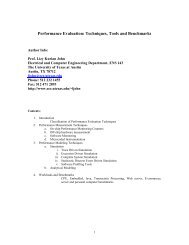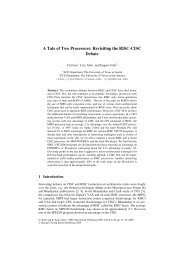Copyright by William Lloyd Bircher 2010 - The Laboratory for ...
Copyright by William Lloyd Bircher 2010 - The Laboratory for ...
Copyright by William Lloyd Bircher 2010 - The Laboratory for ...
Create successful ePaper yourself
Turn your PDF publications into a flip-book with our unique Google optimized e-Paper software.
Watts<br />
5<br />
4<br />
3<br />
2<br />
1<br />
0<br />
Figure 5.7 GPU Power Model (Non-Gated Clocks) – 3DMark06-HDR1<br />
5.3.6 Memory<br />
clock gating<br />
Memory or DRAM power consumption is one of the more variable subsystems. Similar<br />
to the CPU, the application of various power management features yields a wide range of<br />
power consumption. For example consider the standard deviation of power consumption<br />
in SPECjbb of 1.096W compared to average its average of 1.71W. This variation is<br />
caused <strong>by</strong> the three modes of operation: self-refresh, precharge power down and active.<br />
Self-refresh represents the lowest power state in which DRAM contents are maintained<br />
<strong>by</strong> on-chip refresh logic. This mode has a high entry/exit latency and is only entered<br />
when the system is expected to be idle <strong>for</strong> a long period. <strong>The</strong> memory controller selects<br />
this mode as part of its hardware-controlled C1e idle [Bk09] state. Since this state is<br />
entered in conjunction with the hypertransport link disconnect, the power savings can be<br />
represented using the LinkActive% metric. Pre-charge power down is a higher-power,<br />
lower-latency alternative which provides power savings <strong>for</strong> short idle phases. This<br />
allows pre-charge power savings to be considered with normal DRAM activity power.<br />
96<br />
Measured<br />
Modeled<br />
Error<br />
0 20 40 60 80<br />
Seconds<br />
100%<br />
50%<br />
0%<br />
-50%<br />
Error(%)<br />
-100%




